With their unique health benefits, it’s not surprising that medium chain triglycerides (MCTs) have become a staple of many diets. However, as is the case for many other supplements, the increasing popularity of MCTs has given rise to plenty of confusion and misinformation as well.
To dispel these myths and uncover the truth about MCTs and MCT oil dosage, we decided to put together a comprehensive guide that will answer your questions, clear up the confusion, and give you some practical suggestions on how you can use them to boost your results.
If you’d like to jump around to different sections of this lengthy post, feel free to use our clickable table of contents:
- The Benefits of MCTs
- Quick Overview of Their Benefits
- Potential Side Effects and Concerns with MCT Consumption
- What Are MCTs?
- What Are Long Chain Triglycerides? MCTs vs. LCTs
- What Are Short Chain Fatty Acids? MCTs vs. SCFAs
- The Different Types of MCTs
- Natural Sources of MCTs
- What is MCT Oil?
- What is MCT Powder?
- MCT oil vs. MCT Powder — Which One is Better?
- Are MCT Supplements Better than Coconut Oil?
- Should You Add More MCTs to Your Diet?
- Why You Should Use MCTs to Maximize Your Keto Diet
- How To Add More MCTs to Your Keto Diet
- Using MCT Supplements for Cooking and Baking
- How to Find a High Quality MCT Oil
- How to Find a High Quality MCT Powder
- How to Store Your MCT Supplements
- Should You Buy ~100% Caprylic Acid (C8) Supplements like Brain Octane Oil
- Key Takeaways — What You Need to Know About MCTs
The Science-Backed Benefits of MCTs: Are Medium Chain Triglycerides Worth Your Time?
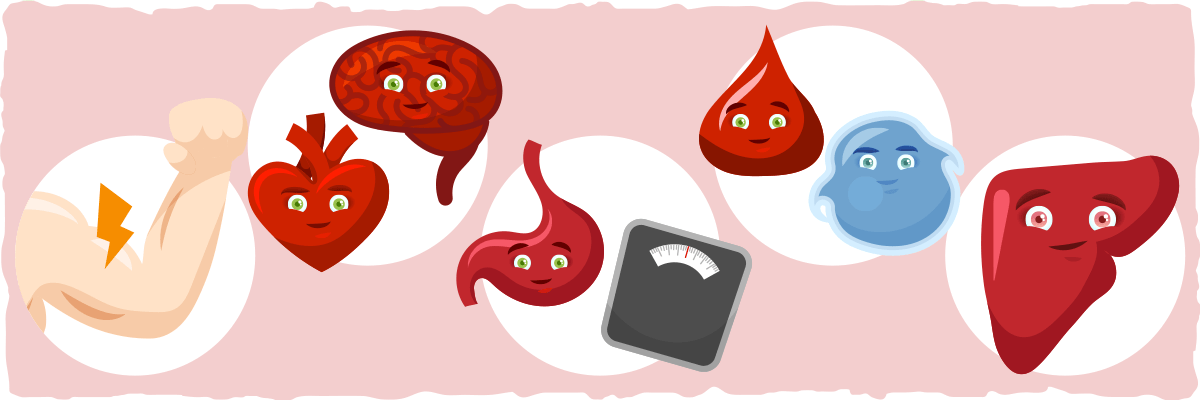
Before we get into the nuances behind MCTs, we must figure out why we should consider consuming these fats.
Can these fatty acids really provide us with benefits that extend beyond other types of fat? Let’s take a look at the research to find out.
1. MCTs and Weight Loss: The Fat that Helps You Lose Fat
MCTs have many properties that make them a helpful weight loss supplement. Here are the five ways that MCTs can help boost your results:
- MCTs have a lower calorie content than other fats.
The most apparent difference between MCTs and, our primary source of dietary fat, long chain triglycerides (LCTs), is that MCTs have fewer calories than LCTs. The calorie difference between the two is just under a calorie (which translates to an insignificant increase in weight loss when substituting MCTs for LCTs), but this is only the icing on the proverbial weight loss cake. (The irony of this idiom is overwhelming (especially if you are on the keto diet already), but let’s continue on.)
- MCTs are rarely stored as fat.
Several animal and human studies have shown that diets higher in MCTs lead to much less fat gain than diets that are higher in LCTs. One recent double-blind study, for example, found that MCTs suppressed the accumulation of body fat in healthy men and women.
This may be due to the fact that MCTs behave metabolically similar to carbohydrates. By this, I mean that the body tends to preferentially burn MCTs as fuel after consumption like the body normally prioritizes burning sugar for fuel.
From a mechanistic perspective, this theory makes sense. When MCTs reach the small intestine, they are digested rapidly into the liver, providing the liver cells with an influx of the substrates they need to produce ketones. The ketones will then be used by other cells throughout the body like the brain and muscles.
Even after consuming meals that contain both carbs and MCTs, the same phenomenon occurs. They are digested and metabolized so quickly that the body will use the right away rather than store them.
In comparison, LCTs will take much longer to digest and undergo a long and arduous journey through the lymph and blood before they make it to the liver. By this time, energy sources like sugar and MCTs are already being used to fuel the cells. As a result, the LCTs we consume are much more likely to be stored as fat.
- MCTs increase our calorie burning capacity.
In one study researchers fed six lean and six obese young males meals containing either LCTs or MCTs plus LCTs. In both the lean and obese subjects, post-meal thermogenesis was enhanced after consuming meals containing MCTs. In other words, consuming MCTs can increase the number of calories we burn after meals.
Another study published in The Journal of Nutrition confirmed this finding. In this double-blind placebo-controlled trial, the researchers found a significant difference in metabolic rate (the number of calories burned at rest) between one group of subjects consuming MCTs and the other group of subjects that had LCTs for their fat intake. The only difference between each group’s nutritional intake was the type of fat they consumed, everything else they ate was the same.
Although the increase in calorie burning that MCTs elicit may only play a small role in our weight loss results, the current literature does suggest that these saturated fatty acids can help mitigate the declining metabolic rate and reduced energy levels that result from calorie-restricted diets. When you consider this along with the research on how MCTs help with appetite control, These fats start to look like the weight loss supplement that we’ve all been searching for.
- MCTs help control our appetite.
Fats, in general, have always been known to help you stay satiated. However, there is one group of fatty acids that may do this more effectively than any other — MCTs (no surprise, right?).
Several studies have reported that MCTs help control appetite more than LCTs. One study on overweight men, for example, found that MCTs led to reduced appetite and increased feelings of fullness when compared to LCTs. The same effect was found in one study on healthy women who spontaneously reduced their fat and calorie intake when given a meal with a significant dose of MCTs versus a high LCT food.
These findings suggest that having meals that contain MCTs will help increase your feelings of fullness and decrease your calorie consumption throughout the day. Although there are many potential explanations for this phenomenon, one of the primary mechanisms behind their ability to suppress appetite is the fact that they stimulate ketone production.
- MCTs increase ketone production.
Being in ketosis is one of the main goals of following a keto diet, and it confers many benefits for the body. (you can read more about these benefits here.)
Many of the benefits of ketosis can be attributed to how efficient of an energy source ketones are. Using ketones as fuel provides our body with more energy and less mess (from free radicals) than metabolizing sugar. Ketones also have been found to act as an appetite suppressant.
The combination of having more highly efficient energy sources circulating the body and appetite reduction make increasing your ketone levels an excellent strategy for improving your weight loss results. One of the easiest ways to experience these benefits is by supplementing with MCTs to increase ketone production naturally and almost instantaneously.
MCTs and Weight Loss From a Broader Perspective
After reading this section alone, you may be thinking that MCTs are the weight loss pill that we’ve all been waiting for. However, despite all five of these promising findings, the effects of MCTs on weight loss remain modest. A meta-analysis of 13 studies found that, compared to LCTs, MCTs did decrease body weight, waist circumference, hip circumference, total body fat, total subcutaneous fat, and visceral fat – but the changes were moderate at best.
In conclusion, MCTs can help boost your weight loss results because they make you feel fuller for longer, are rarely stored as fat, have fewer calories than the more commonly consumed fats, boost your metabolism through their thermogenic effect, and increase your ketone levels, but they do not serve as a substitute for a sustained calorie deficit when it comes to weight loss. MCTs should be used as a supplement for a healthy diet and lifestyle, not as a replacement.
2. MCTs, Energy Levels, and Exercise Performance: Using Fat to Get a Competitive Edge
In recent years MCTs have gained in popularity with athletes seeking to increase energy levels and enhance endurance during training and competition. The research seems to support their effectiveness as well.
One relatively recent study showed that MCT supplementation can significantly reduce blood lactate levels and the rate of perceived exertion (RPE) during moderate-intensity exercise while also extending the duration of high-intensity exercise for recreational athletes. Another study found that endurance-trained cyclists who consumed MCTs during two hours of moderate-intensity activity experienced significant improvements in time-trial performance during subsequent high-intensity training.
When we look at the overall view of the research done on exercise performance and MCT supplementation, the data shows that MCTs can prevent excessive lactate build up, make the activity feel easier than usual, and improve exercise endurance and performance.
How is this possible? The simplest explanation is that MCTs provide you with a readily available source of ketones. During low to moderate intensity activities, our bodies will use these ketones, allowing us to conserve our stored sugars for when we need to increase the intensity. By burning more ketones for fuel, we also rely on metabolic processes that don’t create lactate as a by-product. Altogether, this will make the exercise feel easier while simultaneously improving overall performance.
3. MCTs and Heart Health: Can These Fats Make Your Heart Healthy?
MCTs have a number of properties that may be helpful in preventing atherosclerosis (plaque build up in the arteries) and heart disease as well. Animal studies have found that these fats can help prevent coagulation, lower cholesterol levels, and act as an antioxidant, all of which can help prevent plaque build up in our arteries.
These findings seem to transfer to humans as well. Clinical trials have discovered that MCTs can help lower LDL/HDL ratio, reduce total and HDL-cholesterol, increase HDL, and decrease LDL. However, other studies have shown that consuming MCTs instead of sunflower oil or palm oil have either no effect or an adverse effect on cholesterol levels.
What should we make of the current data? It seems that MCTs have the potential to improve heart health. However, some individuals may experience higher cholesterol levels as a result of MCT supplementation. This is why it is important to consult your doctor and get blood work done before and after you make significant dietary changes. I also recommend reading our article on keto and cholesterol to get a better idea of what your cholesterol numbers mean.
4. MCTs and the Immune System: Fats that Fight Off the Bad Stuff
MCTs have been found to act as a natural antiviral and antibiotic in many cases. In newborn children, for example, MCTs derived from mother’s milk have antimicrobial effects in the gut tract and prevent pathogen transmission. This helps the child develop a functional immune system that is not vulnerable to pathogens and autoimmunity.
MCTs have also been shown to reduce the growth of certain species of Malassezia (an infectious fungus widespread in hospitals) and internal fungi that grow in the digestive tract. Some harmful bacteria (such as streptococcus, staphylococcus) and viruses can be killed by MCTs as well.
5. MCTs as Medicine: The Potential to Save Lives
MCTs have proven useful in treating many medical conditions that are characterized by impaired or damaged fat metabolism. People who have obstructive jaundice, biliary cirrhosis, pancreatitis, cystic fibrosis, celiac disease, Whipple’s disease, Crohn’s disease, regional enteritis, and fat malabsorption can all benefit significantly from supplementing with these easy-to-digest fats.
6. MCTs Increase the Digestibility of Certain Nutrients
Fats are essential for enhancing the absorption of essential nutrients like fat-soluble vitamins. MCTs, however, take this one step further by helping us digest more calcium, magnesium, and amino acids.
7. MCTs May Help Enhance Gut Health
Although there isn’t much human data on how MCTs affect gut health, animals studies suggest that these fatty acids have the potential to improve gut integrity, modulate the immune response, regulate intestinal pH, stimulate intestinal antibody secretion, and modulate many aspects of the gut environment.
We also know that MCTs are natural antibiotics that may help balance our good and bad gut bacteria. This can help create a better gut environment that can protect us from harmful bacteria, fungi, and other parasites.
8. MCTs Help With Diabetes and Blood Sugar Regulation
Studies have shown that MCTs may play a role in the treatment of diabetes and prevention of insulin resistance. Specifically, two high-quality studies found that MCT consumption improved insulin sensitivity (which is an essential component of diabetes prevention and treatment) in both diabetic patients and non-diabetic subjects.
MCTs have also been found to have a slight hypoglycemic (blood glucose-lowering) effect, making it useful for people with diabetes or anyone with a tendency for pre-diabetes.
People who have type 1 diabetes may benefit from MCT supplementation as well. For example, A small study found that MCTs prevented the decline in cognitive performance that is typically experienced by people with type 1 diabetes during periods of hypoglycemia.
However, not all the evidence on MCTs and diabetes is promising. A more recent study, published in 2012, found that MCT consumption can actually induce insulin resistance in human cells.
It is important to note, however, that this study was not conducted in a way that emulates natural MCT indigestion. The MCTs were injected directly into the circulation, which is not what happens when we consume these fatty acids. According to the current literature, it is much more likely that supplementing a blood sugar lowering diet with MCTs will help enhance the results — Just don’t inject them directly into your blood.
9. MCTs Enhance Brain Health and Cognitive Function
As you already know, MCTs stimulate ketone production. What you may not know is that these ketones act as a highly efficient energy source for the brain and improve cognitive function.
Studies have shown that MCTs can help boost cognitive function in individuals with mild cognitive impairment, mild to moderate Alzheimer’s disease who have the APOE4 gene, and some severe cases of dementia. People with other brain-based issues, including Parkinson’s disease, epilepsy, gliomas, and autism, may benefit from MCTs as well.
The mechanism behind the brain-boosting properties of MCTs is the fact that they help increase ketone levels, and ketones can help improve cognitive function and brain health in many ways. If you’d like to learn more about the amazing effects that this alternative fuel source has on us, check out our article on ketones and the brain.
10. MCTs and Liver Function: A Fat that Won’t Make Your Liver Fat?
MCT supplementation in the presence of a low carb diet may improve the health and function of liver cells. In multiple animal models, for example, researchers have even found that replacing long-chain saturated fats and corn oil with MCTs can help prevent non-alcoholic fatty liver disease.
11. MCTs May Increase Your Longevity
Because of their unique benefits, MCTs have been shown to increase longevity in animal models. Kaunitz, one of the most prominent MCT researchers, reported that “the life span [of experimental animals] is longer when the diet is richer in MCTs than LCTs.”
The only evidence that we have for the effect of MCTs on human life span, however, is an epidemiological study from 1978. In this study, the causes of death in many countries were reported. The rate of death due to the complications of heart disease — the number one cause of death in the world — varied from 38.4 to 187.7 per 1,000,000 in most countries.
In Sri Lanka, however, the reported death rate due to heart disease was only 1 per 1,000,000. One variable that may explain the stark contrast between Sri Lanka and the majority of other countries is the fact that the predominant dietary fat in Sri Lanka is coconut oil, which contains over 50 percent MCTs.
Putting It All Together — The Benefits of Medium Chain Triglycerides
After sifting through the research, what can we take away from it all? Here is a brief summary of the benefits of MCTs:
- Weight loss boosting properties
- Appetite reduction
- Improved exercise performance and endurance
- Increased energy levels
- Reduced cardiovascular disease risk in some people
- Enhanced brain health and cognitive function
- Acts as a potential treatment for medical conditions that involve impaired fat metabolism
- May improve insulin sensitivity and blood sugar levels
- Helps boost immune system function and regulation
- Gut health regulation
- Improved absorption of certain nutrients
- Enhanced liver cell function
- May increase longevity and reduce the mortality risk from heart disease
Overall, MCTs provide a wide range of benefits and are a great supplement to add to your health improvement arsenal. However, some of you may have issues with MCTs that can potentially outweigh their benefits.
The Bad Side of Medium Chain Triglycerides — Side Effects and Concerns with MCT Consumption
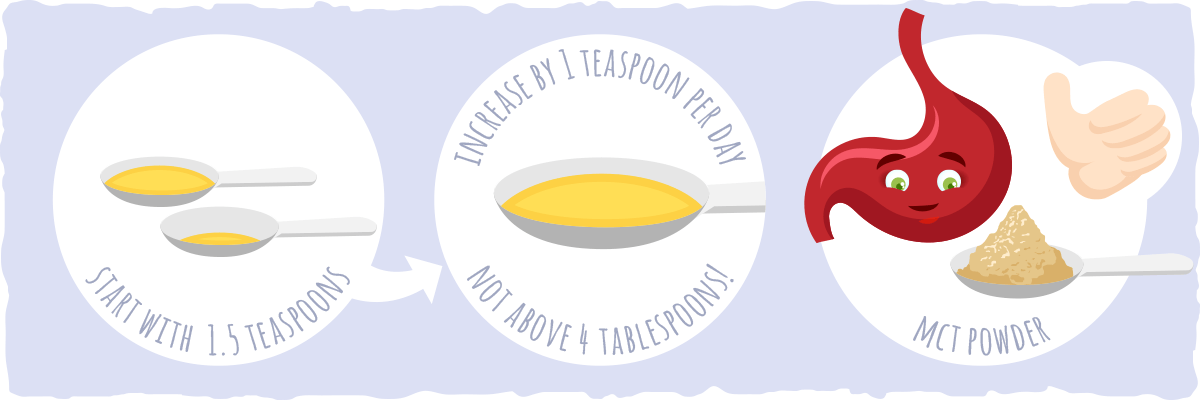
The side effects of consuming more MCTs are usually not serious. The most commonly reported issues related to MCT oil supplementation are nausea, stomach cramping, and other gut problems.
Fortunately, these side effects can be avoided if you start with a small dose of MCT oil and test how your body responds to it. A dose of 1 to 1.5 teaspoons will be all you need to experience some of the benefits of MCT oil while you assess your tolerance.
If this dose causes no side effects, then slowly increase your dose teaspoon by teaspoon each day or every few days until you’ve reached a daily dose of 1 to 4 tablespoons without any issues.
You can also try supplementing with MCT oil powder if you find that you are highly sensitive to the oil. The powder tends to be much easier on the stomach.
Once you’ve addressed these minor side effects, another possible issue lurks in the darkness that most people don’t know about. Studies on mice have discovered that MCTs can promote food allergy by blocking antigen absorption and stimulating Th2 responses. One study, in particular, found that MCTs induced anaphylaxis to peanut protein in mice.
This suggests that MCT supplementation alters the balance between Th1 and Th2 (two varieties of the immune system’s T helper cells). This can have a significant negative impact on conditions like food allergies, asthma, and atopic dermatitis. Although there is no research on MCTs and allergies in adolescents and adults, the animal studies indicate that MCTs have the potential to trigger food allergies.
This is important to be aware of if you notice an allergic reaction or increased sensitivity to previously tolerated foods after supplementing with MCTs. Keep in mind, however, that this phenomenon seems to be relatively rare as I’ve only found a couple of comments online of people who supplemented with MCTs and developed new food allergies. Most of the anecdotes about MCT supplementation seem to be praising its benefits instead.
What are MCTs? A Closer Look at These Unique Fats
Now that we know all the potential benefits and side effects of MCTs, let’s break down what they are to clear up any questions that came up while we were assessing the research.
MCT stands for medium-chain triglycerides. You may also see them referred to as MCFAs (medium-chain fatty acids). They have “medium-chain” in their name because they only have 6-12 carbon atoms.
(Side note: All dietary fats are molecules composed of individual carbon atoms linked into chains ranging from 2 to 22 carbon atoms in length. LCTs ranging from 13 to 18 carbons long are the predominant form of fat in the American diet. MCTs, on the other hand, are composed of only 6 to 12 carbon links, and short chain fatty acids have less than 6 carbon atoms.)
This method of naming fatty acids may seem arbitrary at first, but the number of carbons in the fatty acid chain actually impacts how the body digests and assimilates the fat you consume. For example, MCTs digest rapidly and go directly to the liver while LCTs require bile, enzymes, and chylomicrons for the body to fully absorb them.
Below, you can see a comparison of SCFAs, MCTs and LCTs:
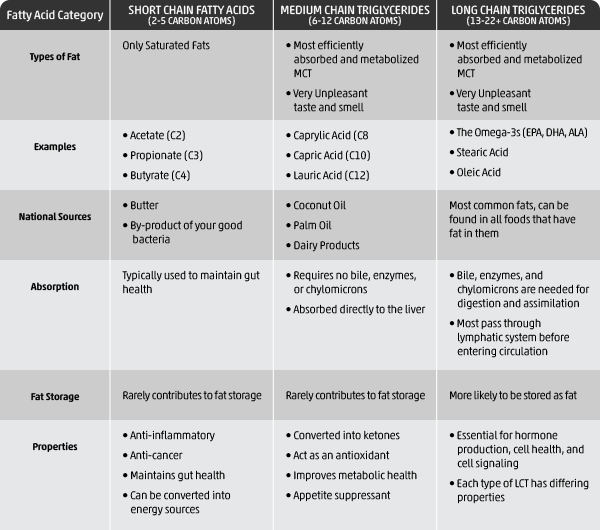
What are LCTs? MCTs Vs. Long-Chain Fatty Acids
Long-chain triglycerides (LCTs) or long-chain fatty acids are referred to as “long chain” because they have 13 carbons or more. Fatty acids that have this many carbons tend to require much more work for the body to process, and thus, no longer fit into the category of an MCT.
(Side note: The longest chain MCT, lauric acid, has 12 carbon atoms and emulates properties of both long chain and medium chain saturated fatty acids. Because of this, lauric acid takes much longer to digest and is the least effective MCT to supplement with.)
There are 17 recognized LCTs, including myristic acid, palmitic acid, stearic acid, arachidonic acid, oleic acid, eicosenoic acid, erucic acid, nervonic acid, omega 3, omega 6, and omega 9 fatty acids.
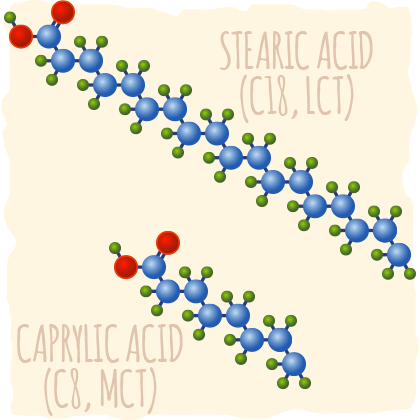
These LCTs can be further categorized by the number of double bonds they have. These double bond-based categories, which you probably already know of, are monounsaturated fats, polyunsaturated fats, and saturated fats. (For more information on the different types of fatty acids, check out our article on the importance of fats.)
When it comes to digesting these hefty fatty acids, LCTs require much more work. Due to their carbon size, they are not easily absorbed by the body and require pancreatic enzymes and bile to break them down.
After they’re broken down and absorbed, they are delivered to the lymphatic system and then transported to the organs, where they will finally be used for energy or stored.
What About Short Chain Fatty Acids? SCFAs vs. MCTs
Although we rarely hear about these little fats, short chain fatty acids (SCFAs) do exist, and they play many roles in the body.
SCFAs are fatty acids with fewer than six carbon atoms.
Our most common source of these fats not provided by our diet, it is absorbed from our gut. In fact, the “good” bacteria in your microbiome produce these fatty acids to help nourish your colon and its cell lining with energy and nutrition.
About 95 percent of SCFAs are:
- Acetate (C2)
- Propionate (C3)
- Butyrate (C4)
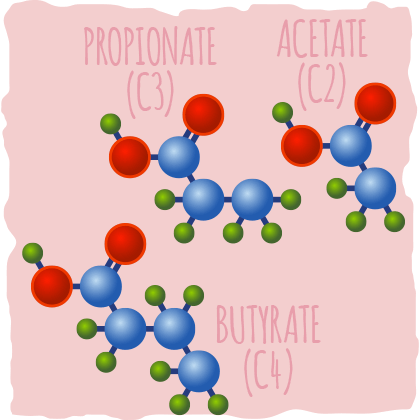
While propionate is used to produce glucose in the liver, acetate and butyrate are both incorporated into other fatty acids. These fatty acids also have anti-inflammatory and anti-cancer properties that are responsible for a wide range of benefits.
The best way to increase your SCFA intake is by feeding your gut bacteria more fiber from high-fiber foods like low carb vegetables.
Keep in mind, however, that eating more fiber will not increase your chances of getting the benefits of MCTs as well. This can only be done by eating foods and supplements that have MCTs in them — especially if those foods and supplements contain the right types of MCTs.
Back to MCT Specifics — The Different Types of Medium Chain Triglycerides
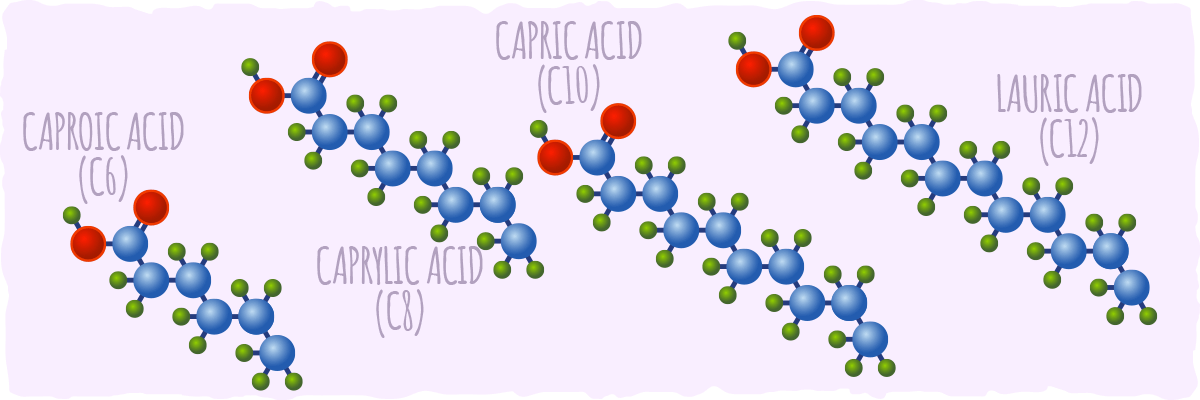
There are the four MCTs that are naturally found in food:
- Caproic Acid (C6)
- Caprylic Acid (C8
- Capric Acid (C10)
- Lauric Acid (C12)
Caproic Acid (C6)
MCT oil supplements that taste a bit off or create a tingle in our throat typically have too much caproic acid (C6) in them.
While it doesn’t taste good at all, there’s usually not enough of it in coconut oil or MCT oil to experience it in full effect. The upside of caproic acid is that it is absorbed and converted into ketones more quickly than any other MCT.
Caprylic Acid (C8)
Caprylic acid makes up 12% of the MCTs found in coconut oil. This MCT is known to have strong anti-microbial properties that help maintain gut health.
As you search for MCT oil supplements, you will find that caprylic acid is typically the most prevalent MCT in them. The higher the C8 content, the more quickly that supplement will raise your ketone levels.
Capric Acid (C10)
This MCT makes up 10% of MCTs in coconut oil. Like caprylic acid and caproic acid, capric acid turns into ketones quickly in the liver. However, due to its two extra carbons, capric acid is processed a bit slower than C8 and C6.
Lauric Acid (C12)
Lauric acid is the main reason why coconut oil is typically used as an MCT supplement. This is because it makes up roughly half of the fats found in coconut oil.
However, unlike the other MCTs, lauric acid undergoes a slower metabolization process and may raise cholesterol levels in a similar way to other long chain saturated fats.
Due to it’s LCT properties, some people debate if lauric acid should even be considered an MCT. It is simply too inefficient of an MCT to be regarded in a the same category as the other three. Because of this, you won’t find it in a high-quality MCT oil.
Below, you can find a chart summarizing what we’ve discussed in this section:
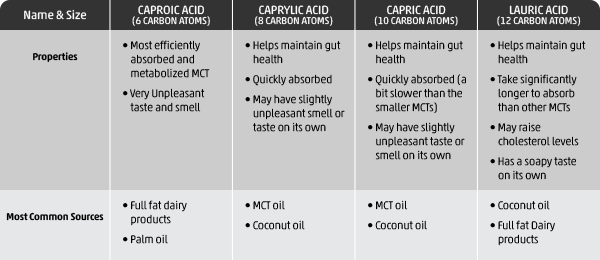
Natural Sources of MCTs
MCTs exist naturally in some animal and plant foods. In fact, breast milk, cow milk, and other forms of dairy and dairy products provide us with MCTs as well as coconuts and palm oils.
Here is a brief overview of the foods that are richest in MCTs:
- Coconut oil — Has more than 60% MCTs.
- Palm kernel oil — Contains more than 50% MCTs.
- Dairy products — Consist of 10–12% MCTs.
Each source contains varying amounts of each MCT. Coconut oil, for example, is about 50% lauric acid (C12), making it one of the best natural sources of this fatty acid and one of the least effective MCT supplements for increasing ketone levels.

Compared to coconut oil, dairy products and palm kernel oil tend to have a higher proportion of C6, C8 and C10 MCTs, but in smaller quantities.
Does this mean you can get plenty of the shorter chain MCTs with these three foods? Yes — but your bank account and your stomach would both suffer. You would have to consume an unhealthy amount of dairy, coconut oil, and/or palm kernel oil to match the benefits that you could get from just one tablespoon of a high-quality MCT oil.
What is MCT Oil?
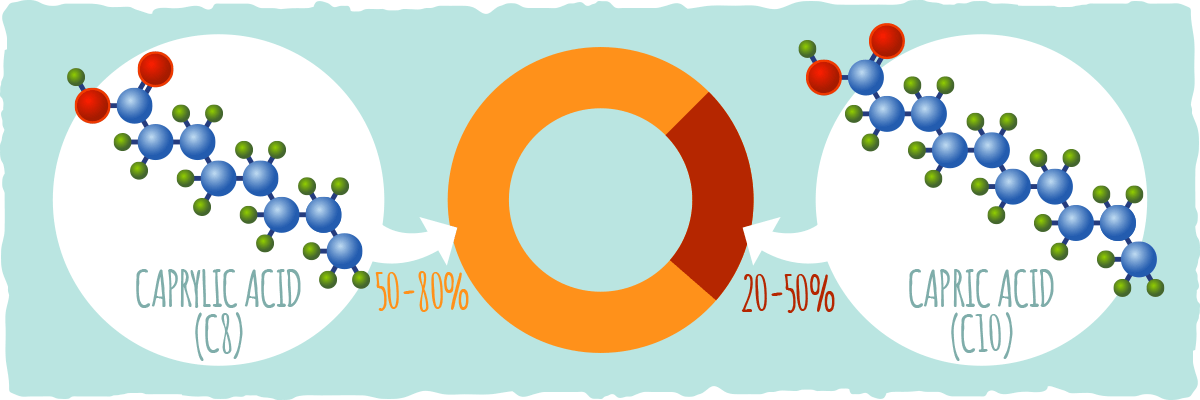
For the greater part of the 20th century, MCTs were only consumed from natural food sources like butter and coconut oil, and not much was known about these fats. At least this was the case until the early 1980s when Dr. Vigen K. Babayan of the Nutrition Laboratory at Harvard University developed a process to produce MCTs in large quantities. The end product of this newly discovered process was called MCT oil. His intention was to use it for the treatment of several medical conditions (such as pancreatic insufficiency, fat malabsorption, and severe hyperchylomicronemia), but it quickly became a huge hit in the supplement industry as well.
The oil itself is made from pure MCTs extracted from whole food oils, particularly coconut oil and palm oil. Most MCT oils are a blend of C8 and C10, although they can also be 100% of either caprylic acid or capric acid.
You will typically find MCT oils with this assortment of MCTs:
- 50-80% caprylic acid (C8).
- 20-50% capric acid (C10).
Caprylic acid tends to make up the majority of the MCTs because it’s more readily absorbed than C10. Usually, lauric acid (C12) and caproic acid (C6) are entirely removed during the MCT oil making process to make a more palatable, high-quality product.
As MCT oil began to catch on, the desire for a more convenient source of MCTs was born. A desire that was fulfilled by the invention of MCT oil powder.
What is MCT Powder?
MCT powder is MCT oil that is turned into a powder via a process called spray drying.
This method is widely used in the food industry to turn liquids into solids (powder) by evaporating the moisture in the particles with hot air.
To get complete the spray drying process, the MCT oil needs to be bound to a carrier powder (the healthiest supplements use a fiber like acacia fiber). Once the MCT oil is bound to the carrier powder, it is officially MCT oil powder and no longer MCT oil.
MCT Oil vs MCT Powder — Which One is Better?
Depending on your budget and what you are looking to do with your MCT supplement, you may find one form of MCTs better than the other.
To help you decide which one will work best for you, let’s look at some of the advantages of each.
MCTs in powdered form:
- are easier on the digestive system.
- are easier to mix in keto recipes because of the dry texture.
- leave a creamy texture in keto drinks with no oily residue.
- can easily be taken through airport security.
- are easy to pack and take with you on the go.
- May come with extra health benefits depending on the ingredients used (check out the “How to Find a High Quality MCT oil Powder” section of this article for more detail).
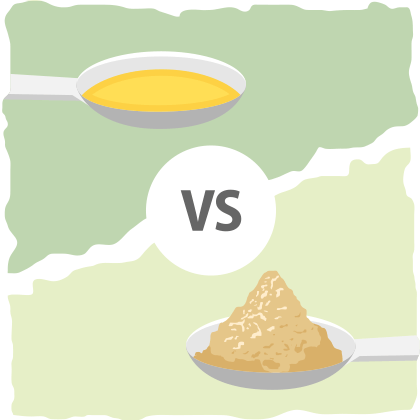
MCT oil is:
- much cheaper.
- serves as good substitute for other oils.
- more widely available.
From this perspective, it seems like MCT oil powders are clearly the best. But before we forget about MCT oil entirely, let’s explore the disadvantages of each supplement.
The cons of using MCT powder are that it:
- is around 2x more expensive than MCT oil (and you get fewer MCTs per ounce).
- may contain additives and fillers that decrease the MCT content of your product.
- isn’t as well researched as MCT oil.
The cons of using MCT oil are that it:
- may leave an oily texture when mixed in drinks, soups, and sauces.
- may cause mild digestive issues.
- might provoke food allergies.
- is difficult to travel with (oil spills are not fun).
Now that we have the advantages and disadvantages of each MCT supplement, it is much easier to see which one will be best for you.
To illustrate what I mean more clearly — If you are on a budget and will only be using the MCTs at home, MCT oil will be precisely what you need. On the other hand, if you are looking for a quick energy boost while you are on the go or are very sensitive to the MCT oil, I recommend putting down the extra cash to get MCT oil powder because of its convenience and versatility.
Below, you can find a summarized chart of what we discussed in this section:
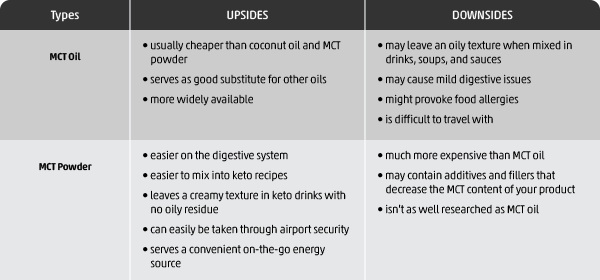
However, we still haven’t directly addressed if MCT supplements are worth your investment in general. We already know that coconut oil is packed with MCTs. Will supplementing with coconut oil be enough to experience the benefits of MCTs that we discussed earlier?
Coconut Oil vs. MCT Oil — Is It Better than Coconut Oil?
The main difference between MCT oil and coconut oil is their MCT content. Coconut oil is roughly 60% MCTs, while MCT oil contains 100% MCTs.
Furthermore, coconut oil contains all four medium-chain fatty acids with the vast majority of them coming from lauric acid (the least efficient MCT). On the other hand, MCT oil only uses the two most efficient and palatable MCTs for energy: caprylic acid (C8) and capric acid(C10). Plus, MCT oil tends to be cheaper than coconut oil as well.
If you’re looking to stay healthy and reap some of the benefits MCTs, coconut oil is enough. However, for those of you who are looking to gain all of the advantages of MCTs and fuel your body with ketones, MCT oil is the best choice. Just make sure you don’t overdo it at first or else you may experience the side effects that we discussed earlier.
The Takeaway — Should You Add MCTs to Your Diet?
Whether you add more MCTs to your diet with high MCT foods like coconut oil or MCT oil supplements, you will be able to experience the benefits of MCTs. To maximize your MCT consumption and subsequent benefits, however, it is best to supplement your diet with an MCT oil or MCT powder supplement that contains mostly caprylic acid (C8) and/or capric acid (C10).
You can get these two MCTs from natural sources, but the two best sources of MCTs, coconut oil and palm oil, only consists of 14% and 7% of these MCTs respectively. This means that you would have to eat around seven tablespoons to get the same amount of caprylic acid (C8) and capric acid (C10) that you would get from one tablespoon of MCT oil. Clearly, MCT oil is the healthiest and cheapest way to get the benefits you are looking for.
However, It is also important to note that your body will not be used to having so many C8 and C10 MCTs at once. For this reason, you may experience minor gut issues at first, and you might also increase your risk of developing food allergies.
With that being said, I believe the benefits of using MCT oil supplements outweigh the potential risks. Its ability to improve various aspects of our health and boost our energy levels and weight loss results make it an incredible dietary supplement — especially if you are on the keto diet.
Why MCTs Are So Helpful for the Keto Diet
The keto diet is one of the most effective diets for fat loss and health improvement, but it can be challenging to adapt to at first. By restricting carbs, you are robbing your body of sugar, its primary fuel source.
If you continue to limit your carb intake, the body will be forced to burn more fat and produce ketones for fuel. However, before this happens in full effect, you will probably experience what many keto dieters refer to as the keto flu, which includes symptoms like mental fogginess and physical fatigue.
MCT supplements are such a helpful tool for keto dieters because they help make ketones readily available for their body to use. This will help increase energy levels and make ketosis easier to adapt to and maintain while remedying some keto flu symptoms along the way.

How is this possible? Here is a quick overview of why MCT oil can be burned as fuel so effectively:
- MCTs reach your liver faster than any other dietary fat. Once they reach the liver, they are typically converted into ketones.
- MCTs don’t have to be broken down into smaller molecules.
- MCTs can enter cells and the mitochondria easily without needing help from other compounds.
For these reasons, supplementing with MCT oil or MCT powder during the first few days of keto dieting may be the knight in shining armor that saves you from the dragon of mental fogginess and physical fatigue. On top of that, if you continue to use MCT supplements after you enter ketosis, you will only increase your energy levels and feel even better.
How to Use MCT Oil To Enhance Your Keto Diet Results
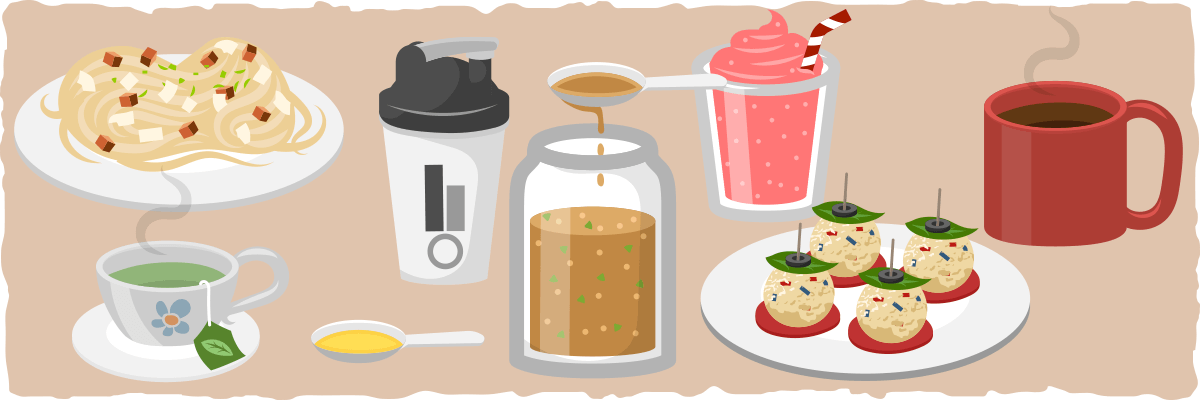
If you want to start adding MCT oil or MCT powder to your diet, here are some general recommendations that you can use as a guide:
How Much MCT Oil Should You Take?
If you’re new to MCT oil, start off with small amounts. Begin with 1 to 1.5 teaspoons a day and slowly increase your intake to get your body accustomed to the MCTs.
If this dose is too much for you, you can also try using MCT oil powder instead. Due to the fact that it tends to cause fewer digestive issues, you may be able to start with a higher dose at first.
Once your body adapts to the increase in MCT consumption, you can up your dosage daily, teaspoon by teaspoon, until you are having 1 to 4 tablespoons a day without any issues.
The typical dose is one to two tablespoons per day. This should provide you with all of the MCTs you need to get the benefits we talked about earlier.
How to Add MCT Oil Supplements to Your Diet
Here are some of the best ways to get more MCT oil into your diet:
- Have it with coffee and other warm drinks. Adding it to your morning drink not only guarantees your intake of healthy fats, but provides the ultimate energy for your body and brain to start the day. Try blending it into a cup of Ketoproof Coffee or Iced Ketoproof Green Tea.
- Add it to your keto smoothies. Add 1 to 2 tbsp of MCT oil to your daily smoothie for a boost of healthy fats and ketones. Here are some low carb smoothies you can try this with:
- Put it in your pre-workout and/or post-workout shakes. Supplementing your pre or post-workout meal with a tablespoon of MCT oil can help improve your performance, endurance, and recovery. MCT oil as a pre-workout supplement can be great for individuals just starting the keto diet who are feeling less energized than usual during their workouts.
- Use it in your keto condiments, dressings, and sauces. Add MCT oil to your favorite keto dressings, condiments, and sauces. Either sub in a tablespoon or two for the primary oil or add it in with the other oils depending on the consistency you want. Here are some keto-friendly recipes you can do this with:
- Drizzle it on top of your meal. If you want to add some extra fat to your keto meal, simply drizzle some MCT oil or sprinkle some MCT powder on top. This works really well with keto pasta dishes and salads.
- Make a quick keto chocolate sauce. Craving some chocolate with your keto dessert? Try whipping up a quick chocolate sauce by mixing cocoa powder and MCT oil together (add your favorite keto sweetener if you want some extra sweetness too). Drizzle this chocolate sauce to add some extra flavor and ketone boosting fats to your keto dessert.
- Add them to your fat bombs. As long as you use a fat/oil that doesn’t melt at room temperature as your primary fat bomb fat source, feel free to add some extra MCT oil or MCT oil powder to make your fat bombs into ketosis-boosting fat bombs. For some delicious fat bomb ideas, check out our comprehensive guide to fat bombs.
- Take it straight. Since MCT oil is tasteless and odorless, it is possible to down your dose without having to add it to anything. You can do the same thing with MCT powder by mixing it with water.
Can You Use MCT Oil and MCT Powder for Cooking and Baking?
It is best to avoid exposing MCT oil and MCT powder to any temperature above 320 degrees Fahrenheit due to the low smoke point of MCTs. When it comes to cooking and baking, stick with using the recommended fats and oils in our keto food list.
How to Find a High-Quality MCT Oil
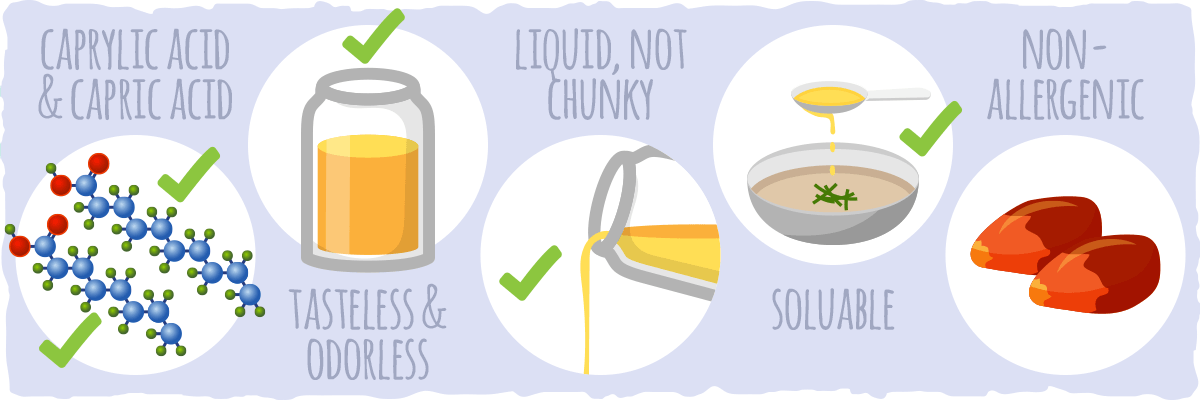
With all of the hype surrounding MCT oil, it is no surprise that dozens and dozens of different MCT oil products have hit the market. How are you supposed to sift through all of these products to find a high-quality MCT oil? Here are a couple of characteristics that you should look for:
- It consists of only caprylic acid (C8), capric acid (C10), or both. If you see an MCT supplement that has lauric acid in it, then it won’t be as effective at providing you with the benefits you expect. Ideally, you want to have a higher percentage of caprylic acid (C8) because it will be digested and converted to ketones more quickly.
- It should be tasteless and odorless. MCT oil doesn’t have a taste or smell because it is removed during the extraction process. If there is a plastic smell or an odd fruity aroma coming from your MCT oil, then it probably has plastic chemicals in it that are leaching from its container. To avoid getting plastic chemicals with your MCTs, I recommend buying only MCT oil products that are sold in glass bottles. However, If you already have MCT oil that is in a plastic container, try transferring it to a glass bottle or refrigerating it to limit how many plastic chemicals get absorbed into the oil.
- It is liquid at room temperature. The final product should be liquid at room temperature. If it is solid or semi-solid, then your MCT oil probably has longer chain fats in it that you don’t want.
- It should be highly soluble. The small size of the carbon molecules in MCT oil increases its solubility in whatever liquid you mix it with.
- It should be sourced from foods that you are not allergic to. Many keto dieters are allergic to coconuts and coconut oil, so, to play it safe, you may want to get MCT supplements that are derived from palm oil or another source that you are not allergic too.
To ensure that your purchase has a minimal impact on the environment and climate change, look for sustainably sourced products. To make things extremely easy, this is the brand that we use and recommend ourselves.
How to Find a High-Quality MCT Oil Powder
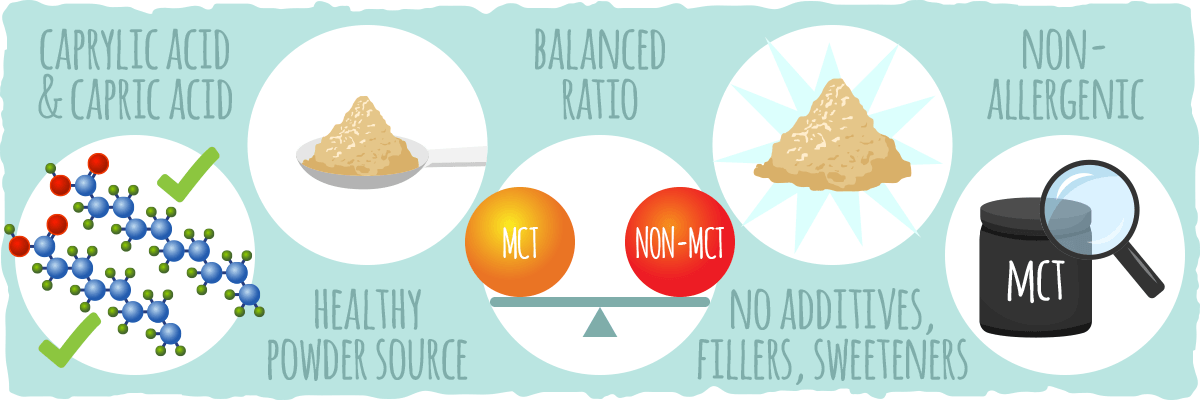
Not a fan of MCT oil? Do you like the convenience of having a ketone boosting powder? Here are some things to keep in mind before buying yourself some MCT oil powder:
- It consists of only caprylic acid (C8), capric acid (C10), or both. You may have to contact the company that produced the MCT powder product to figure out what MCTs are in it. Ideally, you want to have a higher percentage of caprylic acid (C8) with no lauric acid (C12) because it will be digested and converted to ketones much more quickly.
- It is made with a healthy powder source. Your best bet is to look for supplements that are made with acacia fiber or any other fiber that you are not allergic to. You can find out what they used as the carrier powder by checking the ingredients list. The first ingredient should be MCT oil and the second, a healthy powder source. I recommend avoiding anything that adds extra carbs to your diet like maltodextrin or liquid glucose.
- It has a balanced MCT to Non-MCT ratio. Make sure you consider the total grams of MCTs per unit by assessing the ratio of MCTs to non-MCTs in the product (i.e., the ratio of MCT oil to carrier powder and other ingredients). The specific oil to powder ratio is not usually included in the nutrition label of most powders. You may have to read the online description and FAQs or contact the company to find out the MCT to non-MCT ratio. Don’t choose any powder that has less than 70% MCTs.
- It has no fillers or additives. To make sure you get an optimal amount of MCTs with your product, find products that have the shortest ingredient list possible. Keto-friendly sweeteners and real food based flavorings (e.g, cocoa and vanilla) are fine, but when you see other ingredients like lecithin, BHA, BHT, food dyes, xanthan gum, lecithin, or other filler and additives, it is best to stay away. The longer the ingredients list, the more likely you are getting fewer grams of MCTs with every serving and wasting your money.
- There are no unnecessary sweeteners. If you see any sweeteners on the ingredient list other than the ones we recommend in our low carb sweetener article, I recommend searching for a better product.
- It has no allergens in it. Many MCT powders will be made with corn-derived GMO ingredients (i.e., soluble corn fiber) and dairy-based carriers (i.e., sodium caseinate). If you want to avoid ingredients like these for any reason, make sure you read the labels carefully and choose a product that fits your preferences.
- It is flavored with healthy ingredients. If you buy a flavored MCT oil powder make sure it uses real food based flavorings like vanilla, chocolate, herbs, spices, and/or matcha.
To ensure that your purchase has a minimal impact on the environment and climate change, look for sustainably sourced products as well. To make things extremely easy, this is the brand that we use and recommend ourselves.
How to Properly Store Your MCT Oil Supplements
MCT oil and MCT powder can last up to 2 years in a dry, cool place. Avoid exposing it too much light, heat, or oxygen to ensure that it lasts as long as possible without oxidizing.
If you have a choice between buying it in a plastic container or a glass container, always buy the glass. It is highly likely that the chemicals from the plastic bottle will leach into your MCT oil (this probably won’t happen if you have MCT powder).
For those of you who have an MCT oil supplement that is in a plastic container, I recommend either storing it in the fridge or transferring the oil into a glass container and putting it in a cool, dry place.
Upgrading Your MCT Supplements — Should You Ditch the 10 for the 6 and the 8?
After looking at the biochemistry behind MCTs, a predictable pattern emerges — the shorter the carbon chain (6 carbons vs 12 carbons, for instance) the less work it takes your body to process and utilize the energy.
We’ve already explored how the longest of the medium chain triglycerides, lauric acid, takes longer to process than the shorter chains. Following this logic, the most efficient MCT supplement is Caproic acid (C6). So why aren’t there more supplements that feature this MCT?
Unfortunately, caproic acid’s taste and smell is unbearable, and it has been known to cause more digestive issues. This leaves us with caprylic acid (C8) as the most palatable, digestible, and efficient MCT. But how much more effective is caprylic acid than the other popular MCT, capric acid (C10)?
Are ~100% Caprylic Acid (C8) Supplements, like Brain Octane Oil, Worth It?
I couldn’t find a study that compared caprylic acid (C8) and capric acid (C10) head to head. However, there is one study that compared the absorption of each MCT when all four were digested at once.
The study found that MCT levels in the portal vein to the liver do seem to increase with decreasing number of carbons in the fatty acid chain.
Does it increase enough to justify buying an MCT oil product that only has caprylic acid, like Brain Octane Oil, in it? It is hard to tell because this study used a rat model, and the difference in absorption between caprylic acid (C8) and capric acid (C10) was relatively small. Exactly how this translates to humans is unclear at this point.

On top of the lack of clear-cut evidence, we must also consider the difference in price between the different MCT oil supplements. According to the current pricing on Amazon, 32 oz of the cheapest ~100% C8 MCT I could find costs ~$15 more than 32 oz of MCT oil with C8 and C10.
It is also important to note that the studies on MCTs rarely isolate caprylic acid. This means that the benefits of MCTs that we discussed earlier apply to the cheaper and more widely available C8 and C10 MCT oil supplement as well.
In other words, the only benefit that you can get from buying a pure C8 MCT supplement instead of a C8 and C10 MCT supplement is a slight increase in absorption. Whether a potentially small increase in efficiency is worth an extra $15 or not is up to you to decide.
Key Takeaways — What You Need to Know about MCT Oil Uses
Medium Chain Triglycerides (MCTs) are special fatty acids that do things differently than the other fats. Due to the fact that they require no bile, enzymes, or chylomicrons for digestion and assimilation, they can take a shortcut straight to the liver. Once they reach the liver, they provide the cells with the substrates they need to produce alternative fuel sources like ketones.
As a result of their unique digestion and assimilation process, MCTs are able to confer a wide range of benefits, improving our weight loss results, energy levels, exercise performance and endurance, heart health, cognitive function, blood sugar regulation, immune system function, gut health, and liver function, among others.
Although coconut oil and other MCT containing foods can provide you with many of these benefits, using an MCT supplement is the most efficient way to experience them all. Which MCT supplement you chose is up to you. Just make sure you buy a sustainably sourced MCT oil or MCT oil powder that consists of a combination of caprylic acid (C8) and capric acid (C10) with no other unnecessary additives.
When you first incorporate more MCTs into your diet, make sure you start with a small amount (1-1.5 teaspoons) and increase day by day until you work up to a 1-4 tablespoon dose. If MCT oil powder is your supplement of choice, you will probably be able to start with a higher dose at first and increase your dosage more quickly.
To maximize your keto diet, we recommend using MCT oil (this is our favorite) or MCT powder (we recommend this) as your personal ketone and energy level booster. It will be especially useful during your first few days of keto dieting when your body is trying to adapt to carb restriction. The simplest way to add more MCTs to your keto diet is by adding them to your keto smoothies, sauces, salad dressings, condiments, and/or your favorite morning beverage.
However, don’t fool yourself into thinking that these unique fatty acids are a shortcut to sustainable ketosis and weight loss. MCT supplements are simply going to give your energy levels, health, ketone levels, and weight loss results an extra boost. The only way to achieve weight loss, ketosis, and vitality for long periods of time is with a ketogenic diet.
Sources:
- Gut Microbiota and Metabolic Health: The Potential Beneficial Effects of a Medium Chain Triglyceride Diet in Obese Individuals — NCBI
- Medium-chain triglycerides — Science Direct
- Prevention of food allergy development and suppression of established food allergy by neutralization of thymic stromal lymphopoietin, IL-25, and IL-33 — Journal of Allergy and Clinical Immunology
- Dietary medium-chain triglycerides promote oral allergic sensitization and orally induced anaphylaxis to peanut protein in mice — NCBI
- Th2 cytokines and asthma: an introduction — NCBI
- Medium chain triglycerides dose-dependently prevent liver pathology in a rat model of non-alcoholic fatty liver disease. — NCBI
- Medium-chain triglycerides supplement therapy with a low-carbohydrate formula can supply energy and enhance ammonia detoxification in the hepatocytes of patients with adult-onset type II citrullinemia. — NCBI
- Medium-chain triglycerides and conjugated linoleic acids in beverage form increase satiety and reduce food intake in humans. — NCBI
- The top 10 causes of death — World Health Organization
- Dietary medium chain triglycerides prevent nonalcoholic fatty liver disease — ScienceDaily
- Medium Chain Triglycerides (MCTs) — Nutrition Review
- Pilot feasibility and safety study examining the effect of medium chain triglyceride supplementation in subjects with mild cognitive impairment: A randomized controlled trial — NCBI
- Role of Medium Chain Triglycerides (Axona®) in the Treatment of Mild to Moderate Alzheimer’s Disease. — NCBI
- Medium-Chain Fatty Acids Improve Cognitive Function in Intensively Treated Type 1 Diabetic Patients and Support In Vitro Synaptic Transmission During Acute Hypoglycemia — NCBI
- Long- and Medium-Chain Fatty Acids Induce Insulin Resistance to a Similar Extent in Humans Despite Marked Differences in Muscle Fat Accumulation — The Journal of Clinical Endocrinology & Metabolism
- Effects of dietary medium-chain triglyceride on weight loss and insulin sensitivity in a group of moderately overweight free-living type 2 diabetic Chinese subjects. — NCBI
- Dietary substitution of medium-chain triglycerides improves insulin-mediated glucose metabolism in NIDDM subjects. — NCBI
- Comparison of the effects of medium-chain triacylglycerols, palm oil, and high oleic acid sunflower oil on plasma triacylglycerol fatty acids and lipid and lipoprotein concentrations in humans. — NCBI
- Effects of medium-chain fatty acids and oleic acid on blood lipids, lipoproteins, glucose, insulin, and lipid transfer protein activities. — NCBI
- Effects of medium-chain triglyceride ingestion on fuel metabolism and cycling performance. — NCBI
- Effect of ingestion of medium-chain triacylglycerols on moderate- and high-intensity exercise in recreational athletes. — NCBI
- Effects of medium-chain triglycerides on weight loss and body composition: a meta-analysis of randomized controlled trials. — NCBI
- Coconut and sunflower oil ratios in ice cream influence subsequent food selection and intake. — NCBI
- Impact of medium and long chain triglycerides consumption on appetite and food intake in overweight men — NCBI
- Dietary medium-chain triacylglycerols suppress accumulation of body fat in a double-blind, controlled trial in healthy men and women. — NCBI
- Dietary Medium-Chain Triacylglycerols Suppress Accumulation of Body Fat in a Double-Blind, Controlled Trial in Healthy Men and Women — The Journal of Nutrition
- Postprandial thermogenesis in lean and obese subjects after meals supplemented with medium-chain and long-chain triglycerides — The American Journal of Clinical Nutrition
- Medium- versus long-chain triglycerides for 27 days increases fat oxidation and energy expenditure without resulting in changes in body composition in overweight women — International Journal of Obesity
- Greater rise in fat oxidation with medium-chain triglyceride consumption relative to long-chain triglyceride is associated with lower initial body weight and greater loss of subcutaneous adipose tissue. — NCBI
- Weight-loss diet that includes consumption of medium-chain triacylglycerol oil leads to a greater rate of weight and fat mass loss than does olive oil. — NCBI
- Effects of Medium-Chain Triglycerides, Long-Chain Triglycerides, or 2-Monododecanoin on Fatty Acid Composition in the Portal Vein, Intestinal Lymph, and Systemic Circulation in Rats — NCBI
- How Short-Chain Fatty Acids Affect Health and Weight — Healthline
- Medium Chain Triglyceride Oil Consumption as Part of a Weight Loss Diet Does Not Lead to an Adverse Metabolic Profile When Compared to Olive Oil — NCBI
- USDA Food Composition Databases — USDA
- Molecular weight distributions of milk fat triglycerides from seven species. — NCBI
